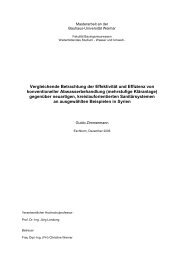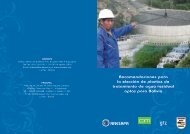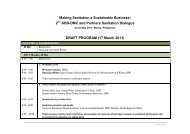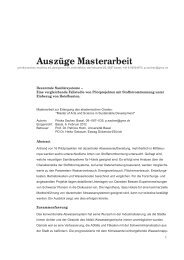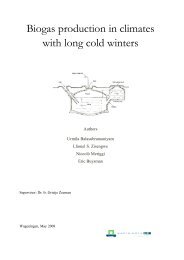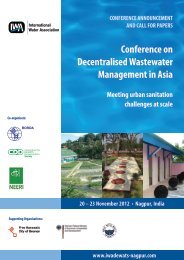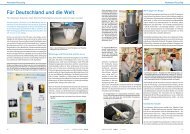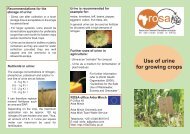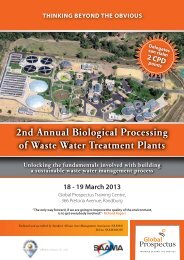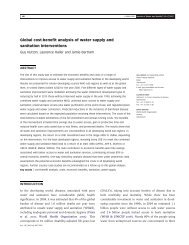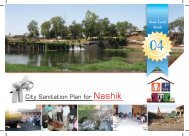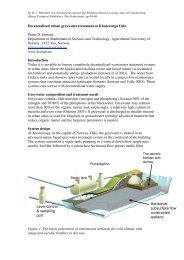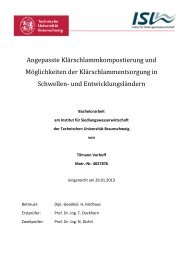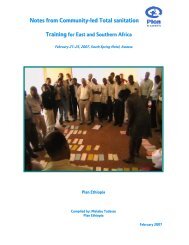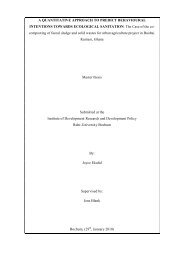Economic Effects of Sustainable Sanitation - SuSanA
Economic Effects of Sustainable Sanitation - SuSanA
Economic Effects of Sustainable Sanitation - SuSanA
Create successful ePaper yourself
Turn your PDF publications into a flip-book with our unique Google optimized e-Paper software.
Table 4: continued<br />
Stakeholder<br />
group<br />
Logistic<br />
companies/<br />
associations<br />
Farmers<br />
Stakeholder Position<br />
(Comment)<br />
Willingness to pay for<br />
sanitation (0.04 – 0.07 EUR<br />
per adult and day)<br />
Not willing to invest in solid,<br />
permanent sanitation facilities<br />
Can be motivated by<br />
incentives<br />
Landlords Willing to construct UDDTs<br />
(problem: money)<br />
PEA Willing to be involved into the<br />
business <strong>of</strong> human excreta<br />
WSA Not willing to be involved<br />
into the business <strong>of</strong> human<br />
excreta logistics<br />
Transporters<br />
Association<br />
―Railway‖<br />
New logistics<br />
company that has<br />
to be established<br />
Sugar cane<br />
growers<br />
Willing to transport the dried<br />
faeces in closed boxes<br />
Reason<br />
(Comment)<br />
Proper facilities are<br />
appreciated to some extent<br />
High rate <strong>of</strong> fluctuation in<br />
the slums (tenancy)<br />
Money is scarce<br />
No need to keep on building<br />
new toilets or pay for<br />
emptying<br />
Would not differ from their<br />
business as usual.<br />
But not possible due to cross<br />
contamination.<br />
(The price for the service<br />
delivery is high 53 )<br />
Trucks are used for drinking<br />
water.<br />
(The price for the service<br />
delivery would also be high<br />
(similar to PEA))<br />
Business oriented.<br />
(The price for the service<br />
delivery is high)<br />
This company does not exist yet. It is going to be developed<br />
according to the specific needs. Own trucks have to be<br />
purchased.<br />
Not willing to use urine and/or<br />
faeces as fertiliser<br />
No willingness/capacities for<br />
being involved into the<br />
process <strong>of</strong> collection<br />
Mostly willing to pay (for a<br />
dried fertiliser)<br />
No willingness to invest in<br />
infrastructure<br />
Fear lack <strong>of</strong> quantity and<br />
quality. (Huge quantities<br />
needed: Up to 2 000 t/a <strong>of</strong><br />
conv. fert. per farm)<br />
Application will be too<br />
labour intensive and thus<br />
expensive.<br />
All decisions are based on<br />
economic reasons<br />
Want to focus on their own<br />
business<br />
Know about the value <strong>of</strong><br />
nutrients.<br />
Farm expenses have to be<br />
minimised. Why to change?<br />
Case Study Kampala<br />
Partner<br />
(Yes/No; Type)<br />
Yes<br />
(Producer)<br />
No<br />
No<br />
Yes<br />
(Faeces logistics)<br />
Yes<br />
(Urine and faeces<br />
logistics)<br />
No<br />
52



